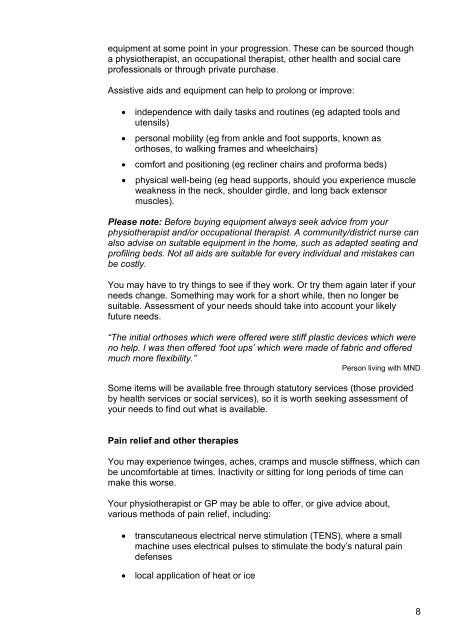Physiotherapy for people with motor neurone disease (MND)
Physiotherapy for people with motor neurone disease (MND)
Physiotherapy for people with motor neurone disease (MND)
Create successful ePaper yourself
Turn your PDF publications into a flip-book with our unique Google optimized e-Paper software.
equipment at some point in your progression. These can be sourced though<br />
a physiotherapist, an occupational therapist, other health and social care<br />
professionals or through private purchase.<br />
Assistive aids and equipment can help to prolong or improve:<br />
• independence <strong>with</strong> daily tasks and routines (eg adapted tools and<br />
utensils)<br />
• personal mobility (eg from ankle and foot supports, known as<br />
orthoses, to walking frames and wheelchairs)<br />
• com<strong>for</strong>t and positioning (eg recliner chairs and pro<strong>for</strong>ma beds)<br />
• physical well-being (eg head supports, should you experience muscle<br />
weakness in the neck, shoulder girdle, and long back extensor<br />
muscles).<br />
Please note: Be<strong>for</strong>e buying equipment always seek advice from your<br />
physiotherapist and/or occupational therapist. A community/district nurse can<br />
also advise on suitable equipment in the home, such as adapted seating and<br />
profiling beds. Not all aids are suitable <strong>for</strong> every individual and mistakes can<br />
be costly.<br />
You may have to try things to see if they work. Or try them again later if your<br />
needs change. Something may work <strong>for</strong> a short while, then no longer be<br />
suitable. Assessment of your needs should take into account your likely<br />
future needs.<br />
“The initial orthoses which were offered were stiff plastic devices which were<br />
no help. I was then offered ‘foot ups’ which were made of fabric and offered<br />
much more flexibility.”<br />
Person living <strong>with</strong> <strong>MND</strong><br />
Some items will be available free through statutory services (those provided<br />
by health services or social services), so it is worth seeking assessment of<br />
your needs to find out what is available.<br />
Pain relief and other therapies<br />
You may experience twinges, aches, cramps and muscle stiffness, which can<br />
be uncom<strong>for</strong>table at times. Inactivity or sitting <strong>for</strong> long periods of time can<br />
make this worse.<br />
Your physiotherapist or GP may be able to offer, or give advice about,<br />
various methods of pain relief, including:<br />
• transcutaneous electrical nerve stimulation (TENS), where a small<br />
machine uses electrical pulses to stimulate the body’s natural pain<br />
defenses<br />
• local application of heat or ice<br />
8


